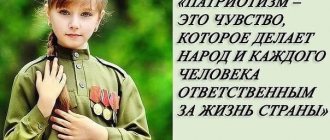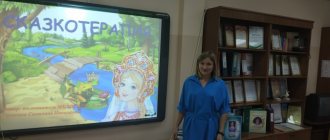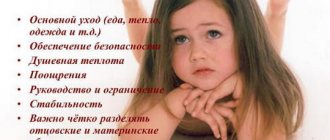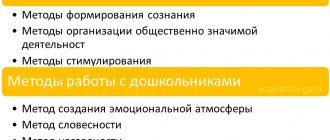MAGAZINE Preschooler.RF
Patriotic education in the middle group (work experience)In modern conditions, when profound changes are taking place in the life of society, patriotic education is becoming one of the central areas of work with the younger generation. Now, in a period of instability in society, there is a need to return to the best traditions of our people, to its age-old roots, to such eternal concepts as clan, kinship, and Motherland. The feeling of patriotism is multifaceted in its content: it is love for one’s native places, pride in one’s people, a feeling of inseparability with others, and a desire to preserve and increase the wealth of one’s country. At each age stage, manifestations of patriotism and patriotic education have their own characteristics.
During the period of primary and secondary preschool age, high social motives and noble feelings develop. How they are formed in the first years of a child’s life largely determines his entire subsequent development. During this period, those feelings and character traits begin to develop that already invisibly connect him with his people, his country. The roots of this influence are in the language of the people that the child learns, in folk songs, music, games, toys, impressions about the nature of his native land, about the work, life, morals and customs of the people among whom he lives.
By patriotic education of children, we understand the interaction of an adult and children in joint activities and communication, which is aimed at revealing and forming in the child universal moral qualities of the individual, familiarization with the origins of national and regional culture, the nature of the native land, nurturing an emotionally effective attitude, a sense of belonging, attachment to others.
The goal of instilling patriotism in children of middle preschool age is to develop in them the need to do good deeds and deeds, a sense of belonging to the environment and the development of such qualities as compassion, empathy, resourcefulness, and curiosity.
The tasks of patriotic education of children of middle preschool age include:
- formation of a spiritual and moral attitude and a sense of belonging to one’s home, family, kindergarten, city, village
- the formation of a spiritual and moral attitude and a sense of belonging to the cultural heritage of one’s people;
- formation of a spiritual and moral attitude towards the nature of the native land and a sense of belonging to it
- nurturing love, respect for one’s nation, understanding one’s national characteristics, self-esteem as a representative of one’s people, and a tolerant attitude towards representatives of other nationalities (peers and their parents, neighbors and other people).
The content of patriotic education of children of middle preschool age in our group is revealed as follows:
- introducing children to cultural heritage, holidays, traditions, folk applied arts, oral folk art, musical folklore, folk games through learning folk outdoor games, staging and telling nursery rhymes and jokes to children.
- acquaintance with family, history, family members, family traditions; with the kindergarten, its children, adults, games, toys, traditions; with city, village, coat of arms, landmarks. He is very actively involved in the organization of various photo exhibitions on the topics: “Me and my mother” , “Best memories of summer holidays” , design of a subject-development environment - a patriotic corner, family albums, albums of village sights and the features of our kindergarten)
- organization of creative, productive, playful activities for children, in which the child shows compassion and care for people, plants, and animals in different seasons of the year. Participation of children in short-term projects “Feed the birds in winter” , “How to please a friend” , “Young helpers of nature” , etc.
One of the components of patriotism is the cultivation of love for native nature. Gradually, children form ideas about their native village, their native land. Nature becomes closer and clearer, children try to do something for it, and feel a sense of responsibility towards it. And it is precisely these qualities that are manifested in children when participating in the long-term project “My Motherland-Samara Territory” , which began in the 2nd junior group with the project “Animals of our region” and continued in the middle group with the project “Birds of the Samara Territory”
Interaction with parents
Of particular importance when solving the problems of patriotic education is close contact with the student’s family. Parents provide great assistance and actively participate in the life of the kindergarten, showing creativity, imagination, and enthusiasm. With their help, exhibitions of drawings and crafts are held. With great pleasure they take part in creative competitions for patriotic education. In such as “Village Coat of Arms” , “Folk Doll” . Help with project activities.
Patriotic education is carried out in all areas of our work with children: in familiarization with the environment and with fiction, speech development, music, and fine arts.
| Next > |
Patriotic education of children of primary and secondary preschool age
Patriotic education in kindergarten through games
While playing, children not only develop and have fun, but also learn a lot and get to know the world around them. Patriotic education of preschool children is possible only through play. It is in the game that you can introduce children to their native culture, develop a sense of patriotism for their land, city, and people.
- Beautiful Dymkovo or Gzhel toys, all kinds of whistles and Russian nesting dolls, clay bears and bunnies - all this teaches you to appreciate and love the craftsmanship of your people, and evokes a sense of duty for the beauty made by the hands of the craftsmen of your homeland. There should be as many such truly national toys in kindergarten as possible, because it is with them that children begin to get acquainted with their native culture and creativity, crafts and crafts, laying a solid foundation of patriotism and love for their fatherland.
- In addition, dolls in national costumes perfectly establish love for their homeland. It will be interesting and useful for both girls and boys to look at a beautiful dress with folk embroidery, a headdress in the form of a wreath or kokoshnik, and multi-tiered beads. You can make and sew dolls yourself. Such games are a great help in the patriotic education of children from an early age.
Patriotic education of preschool children through song creativity
- Little children love to listen to an adult sing, and sometimes they try to sing along. A child needs to hear folk melodies and songs, nursery rhymes and lullabies, and comic songs as often as possible. Song creativity is very understandable even to the youngest children. In this way, patriotism and love for one’s national culture and one’s people are fostered. You can not only sing songs yourself, but also include them in audio recordings.
- Children will also be interested in learning about national musical folk instruments. It is advisable to show them not only in the picture, but also to purchase miniature folk musical instruments for the kindergarten, so that the children themselves can make sounds on them, get to know them, look at and touch them. Wooden spoons, pipes, flutes, drums, tambourines, harmonicas, maracas, rattles - all this will bring not only benefits, but also a lot of joy to young children.
Patriotic education in preschool educational institutions for children of senior preschool age
Patriotic education in kindergarten through art
- Children of senior and preparatory groups of kindergarten can already be introduced to the artistic arts of their native land and country. In drawing and applied arts classes, it is advisable to show reproductions of paintings and sculptures by artists and sculptors of our homeland, talking about their life and work. You can invite children to draw a drawing on the same topic as any famous countryman artist, or to make a figurine out of plasticine similar to a sculpture by a famous master.
- In kindergarten, it is advisable to organize exhibitions with children's works dedicated to any national calendar holiday.
- It would be very interesting to organize a trip to the national museum of your hometown. Children 6-7 years old will already understand and be interested in a lot of things, and the story of an experienced guide will certainly leave wonderful impressions of such an event.
Nurturing patriotism in preschoolers through musical activities
- With older children, it is necessary to learn children's folk songs and dances. It is not necessary to learn a complex dance with many movements. In order for a child to understand and love the dance culture of his homeland, a few characteristic movements are enough, which will be complemented by a beautiful and rhythmic musical arrangement and bright national costumes, as well as attributes in the form of ribbons, flowers, twigs, and so on.
- Usually all children sing folk songs with pleasure and dance to them, since most of these works are of a perky and cheerful nature and most often have an interesting semantic plot. You can organize national song and dance competitions within the kindergarten, as well as hold calendar and ritual holidays. By coming into contact with the music and creativity of his country or region, the child begins to love and appreciate his people and his fatherland.
It is obvious that activities for patriotic education in kindergarten can and should be very diverse. It is impossible to instill love for the Motherland in children through boring lectures and moral teachings, and when drawing up a plan for patriotic education, it is necessary to take all this into account. So, in addition to the above, moral and patriotic education in preschool educational institutions can be carried out by organizing meetings with compatriots, writers, artists, craftsmen, heroes of the native land. And also by organizing trips to city concerts of folk songs and dances, excursions around their hometown with visits to monuments and other attractions, reading folk tales, poems and epics, telling children about the way of life, national costumes, culture, customs and traditions of their people.



